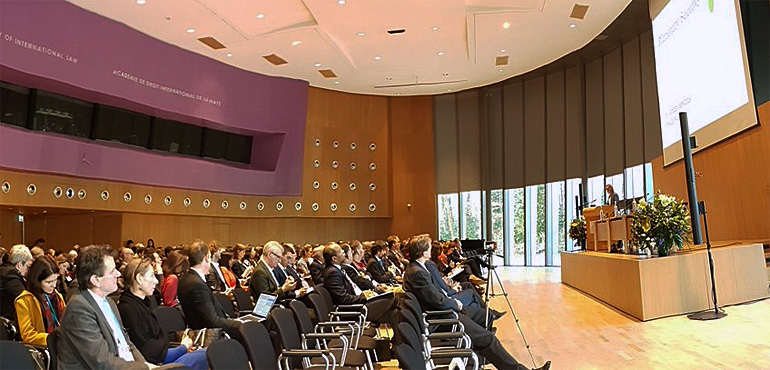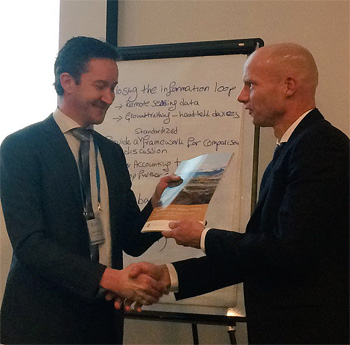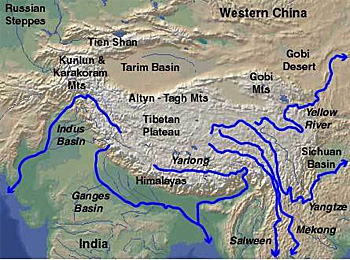Multi-track framework for water diplomacy launched at Planetary Security conference, The Hague

At the second Planetary Security conference, The Hague Institute for Global Justice launched its Multi-track water diplomacy framework. The framework provides an approach for a legal and political economy analysis to diagnose water-related disputes and improve cooperation over shared waters.
This framework is a timely tool to help to diagnose water problems across sectors and administrative boundaries, and at different levels of governance. It supports conflicting parties to jointly seek new opportunities and not to continue endless negotiations based on distrust.
The launch took place in the Hague on 5 December as team leader of water diplomacy Patrick Huntjens handed over the first edition of the framework to the Netherlands' water envoy Henk Ovink.
 Patrick Huntjens (left) handing over the first edition of the framework to the Netherlands' water envoy Henk Ovink.
Patrick Huntjens (left) handing over the first edition of the framework to the Netherlands' water envoy Henk Ovink.
Broaden up dialogue
The Multi-track diplomacy framework for solving disputes over shared waters, fills a gap in theory and practice by broadening up the dialogue and look for a zone of possible effective cooperation (zopec).
It identifies intervention points and helps to formulate sustainable solutions that can include different views, as well changing and competing needs.
“A zero sum thinking can never bring a sustainable solution”, argued Patrick Huntjens of The Hague Institute for Global Justice on the occasion of the launch.
He referred to the idea that negotiations should lead to a situation in which each participant's gain or loss is exactly balanced and water is used only once by only one party.
Huntjens advocated water diplomacy as a tool to ensure that shared water resources are managed efficiently, sustainable and equitably. This is only possible if the benefits derived from the water use are shared, rather than its allocation.
“Instead, diplomacy should be more creative and seek for mutual gains and common interest”, he said.
The mutual-gains approach stimulates to identify key factors that affect water cooperation by diagnosing water problems across sectors and administrative boundaries, and at different levels of governance.

India and China have begun discussions to jointly monitor the Himalayan glaciers that supply water to both the Ganges, Indus and Yangtze rivers.
River as an economical corridor
The Hague Institute for Global Justice has been able to test its new framework to the Brahmaputra basin. More recently, the existing dispute between Indian and Bangladesh seems to widen as concerns are emerging about the utilization of the Brahmaputra by China.
“We interviewed stakeholders in Bangladesh, India, Bhutan and China, including governments at different levels, diplomats, civil society organisations, private sector and academia”, Huntjens explained.
“This enabled us to identify potential areas for cooperation. So we organised a meeting between the riparian states of the Brahmaputra, discussing the possibilities. Everybody reacted enthusiastically as we talked also about the river as an economical corridor for trade. For instance, we talked about trading grain for water, ecosystem services for hydropower and carbon trading.”
To Huntjens this case study clearly demonstrated the potential of the framework to facilitate a paradigm shift among key stakeholders in water-related disputes from a zero-sum approach to one of mutual gains.
Show case for river rehabilitation
The Hague Institute for Global Justice has also drawn insights on water diplomacy from its participation in an international consortium to develop a masterplan for the development of the Jordan valley. This plan was published in June 2015.
The plan aims to convert the polluted river and the economical depressed area into an international show case of river rehabilitation and regional stability. The plan identifies 127 projects with a total investment value of 4.58 billion US dollar until 2050.
Research project
The Multi-track water diplomacy framework is developed within the context of the research project Water Diplomacy: Making water cooperation work.
This project is led by The Hague Institute for Global Justice, in collaboration with the Stockholm International Water Institute (SIWI), International Centre for Water Cooperation (ICWC), International Union for the Conservation of Nature (IUCN), Uppsala University, University of Otago, University College Cork and Tufts University Water Diplomacy Program.
This news item was originally published on the website of The Hague Institute for Global Justice.
Read also on this website
● Palestine-Israeli talks on shared waters at seminar in the Hague, the Netherlands, 30 April 2014
● Successful water diplomacy begins with joint fact finding, 19 November 2013
● Water diplomacy can ease down conflicts by widening the scope of parties involved, 15 November 2013
More information
The Hague Institute for Global Justice
The Hague, the Netherlands
+31 70 30 28 130
www.thehagueinstituteforglobaljustice.org
Presentation by professor Aaron Wolf at Oregon State University addressing the disputes in the river basins of the Himalaya range and the river Jordan (Water security & peace conference, November 2013).



